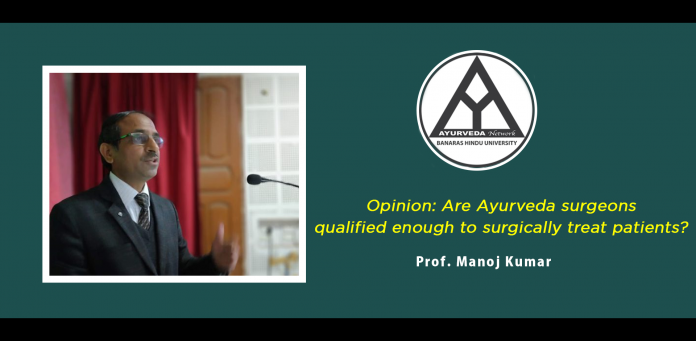OPINION
Are Ayurveda surgeons qualified enough to surgically treat patients?
Dr. Manoj Kumar, Professor, Faculty of Ayurveda, Institute of Medical Sciences, Banaras Hindu University, Varanasi-221005. Email: mkumarbhu@gmail.com.
A surgeon must have very good domain knowledge and training before s/he could be allowed to surgically treat patients.
Surgery is not just about skill. It requires a great deal of knowledge integrated in its system from other domains, basic as well as clinical, such as anatomy, physiology, pharmacology, biochemistry, microbiology physics, chemistry, statistics, clinical methods and so on. It demands ability to make right decisions, efficiency to deal with complications, and skills to perform surgical procedures etc. This applies equally to both Allopathy as well as Ayurveda surgeons.
The Allopathic system of medicine, although having its roots in ancient systems of medicine, is generally considered to have evolved in the last few centuries. It has included other knowledge domains within its scope and integrated them within itself to build a healthcare system, so called modern medical system. Although, other systems like Ayurveda are not less modern than Allopathy as they have also been in continuous process of integration of contemporary knowledge domains within their system.
It is true that for many centuries before independence, Ayurveda did not see much growth despite the fact that India had remained the world leader in the field of medicine and surgery in ancient times. About a century ago there were hardly any post-graduation colleges in India. But after independence the Ayurveda education was gradually institutionalized and entered a phase of fast revival and evolution. The domain knowledge of Ayurveda has grown at a rapid pace in the past few decades. It involves (a) better understanding of ancient Ayurveda texts and its application to serve the patients, (b) integration of modern knowledge, materials and procedures from other knowledge domains including Allopathy, (c) conducting research with application of modern research methods; and (d) field experience obtained from serving the vast population of India.
Ayurveda is not merely a body of ancient principles and practices prevalent in Ancient India. It is, rather, a living medical system which on one hand includes all the ancient principles and practices, and on the other is open to modern ideas, principles and practices which can be integrated in its basic framework.
The surgical disciplines are not new to Ayurveda. Sushruta is widely regarded as the father of surgery. Even apart from Sushruta, there is a long list of surgeons like Dhanwantari, Videha, Gargya, Galava, Vagbhatta and Jeevaka who belong to the tradition of surgeons in India. There was never a time when surgeries were not performed by Ayurveda surgeons. Advances in modern science provided new opportunities to Ayurveda as well as Allopathy systems. But Allopathy, being a global medical system -equipped with huge manpower, resources, and immense government support- grew much faster than Ayurveda could grow.
However, the growth of Ayurveda, although slow, remained consistent. Institutionally qualified Ayurveda surgeons have always performed surgeries based on the teaching and training they have received. Their curriculum has been regularly updated by the Central Council of Indian Medicine keeping in pace with the recent medical advancements. More complex surgical procedures are gradually being added to update the curriculum. This is how a professional medical system grows. Allopathy in India has grown and is growing in this way. Ayurveda is no exception to this natural growth process.
And, Ayurveda surgeons are institutionally qualified, well-trained personnel who are well versed in the domain knowledge of Ayurveda and adequately skilled to surgically treat patients.





